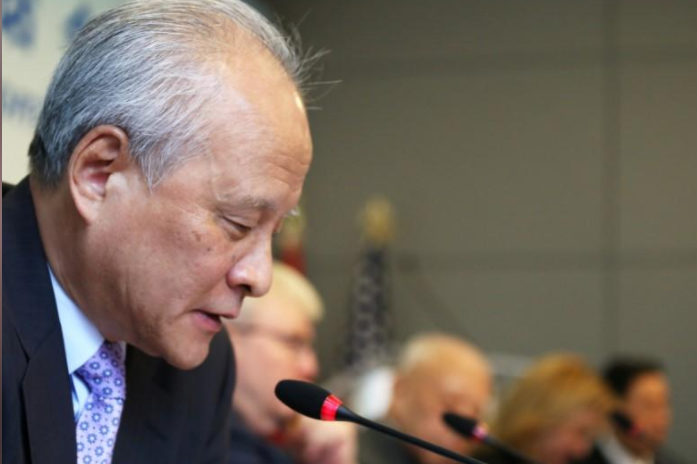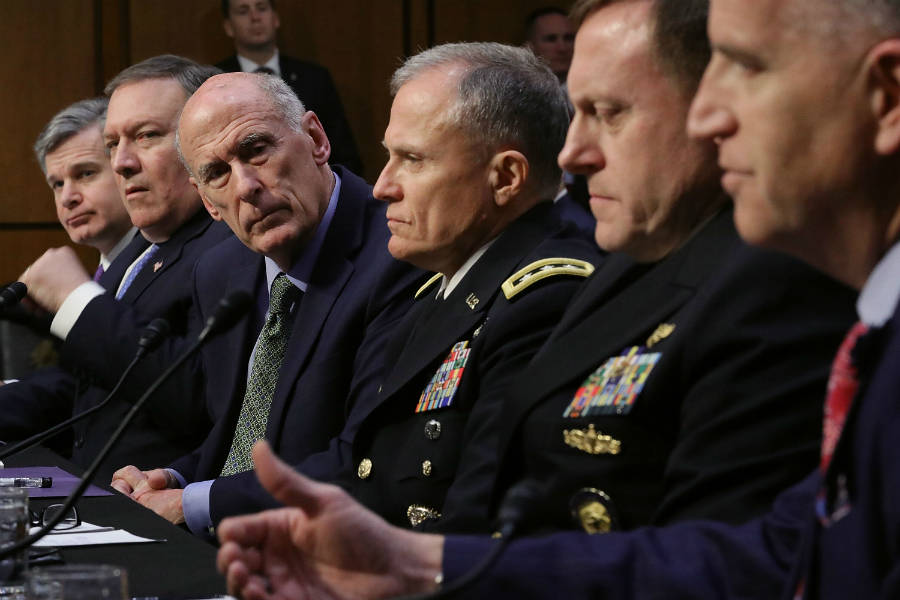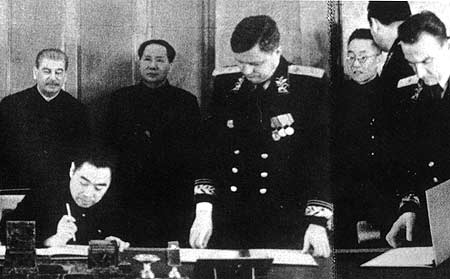
 Cui Tiankai says U.S. Should Not Advocate Confrontational Strategy Towards China
Cui Tiankai says U.S. Should Not Advocate Confrontational Strategy Towards ChinaAmbassador of the People's Republic of China to the United States Cui Tiankai spoke this week calling for "overall cooperation" between the U.S. and China. His remarks came after the director of U.S. national intelligence Dan Coats testified before the Senate Intelligence Committee outlining a series of potential threats the United States faces from adversaries, and China in particular.
Naming China as a major threat has put an even greater strain on Sino-U.S. ties. Despite a largely successful state visit last year, the Trump administration often refers to China as a danger to U.S. power and Americans, both economically and militarily. China-US Focus contributor Zhang Wenzong explains that from Trump's perspective, "the world is full of danger and competition, with globalization and the rise of China at the expense of the U.S. economy and U.S. workers." Moreover, "military and trade hawks" in the administration have more influence "while some moderate senior officials in the State Department were marginalized."
Cui warned against confrontation in his statement. "It's certainly paranoid to fear that a China that follows its own path of development would be confrontational to the United States. And it's dangerous to advocate any strategy for confrontation," he said. The ambassador emphasized that China will not change its politics and culture to align with U.S. interests.
 New U.S. Worldwide Threat Assessment
New U.S. Worldwide Threat AssessmentOn Tuesday, the U.S. intelligence community released the 2018 Worldwide Threat Assessment, a document which examines what the intelligence agencies consider threats to U.S. national security. The document included categories such as cyber security, weapons of mass destruction, terrorism and organized crime, and also named certain countries as threats to U.S. national security, including China. Territorial disputes in the South China Sea and North Korea's nuclear program were mentioned as possible hot-spots for conflict in the Asia-Pacific region. The Belt and Road Initiative was also included in the passage about China, although the specific threat this entailed was not detailed. "China will also pursue efforts aimed at fulfilling its ambitious Belt and Road Initiative to expand China's economic reach and political influence across Eurasia, Africa, and the Pacific," the document reads.
China also appeared in other sections, including as one of four countries named as "pos[ing] the greatest cyber threats to the United States during the next year." Russia, Iran and North Korea were the remaining three. The document also mentioned international and domestic threats to the U.S., such as climate change and mass shootings. The document was presented at a hearing in Washington, D.C., on Tuesday to the Senate Intelligence Committee, which was attended by the directors of the FBI and CIA and other high profile intelligence officials.
At a news briefing on Wednesday, Chinese foreign ministry spokesman Geng Shuang said in response to a question about the threat assessment document: "I do not know where the severe feeling of insecurity in the United States came from. . .We hope the U.S. will discard the zero-sum mindset."
 Chinese New Year Celebrations Begin
Chinese New Year Celebrations BeginThe Lunar New Year, or Chinese New Year, begins today, marking the beginning of spring and a week-long vacation period. In China, the festival represents the largest annual migration of people in the world, with nearly 3 billion trips expected using public transport between February 1 and March 12. The festival is also celebrated as a public holiday in countries such as Singapore, Malaysia, South Korea and Vietnam.
From the China-US Focus team, Happy Chinese New Year. We wish everyone a happy and harmonious Year of the Dog.
 This Week in Chinese History
This Week in Chinese HistoryThis week in 1950, on February 14, China and the USSR signed a treaty called the "Sino-Soviet Treaty of Friendship, Alliance and Mutual Assistance," which remained in place for thirty years. The purpose of the treaty was to strengthen "peace and universal security." Both parties agreed to "mutual respect for State sovereignty", "non-interference" and cooperation on economic development.
Prepared by China-US Focus editorial teams in Hong Kong and New York, this weekly newsletter offers you snap shots of latest trends and developments emerging from China every week, while adding a dose of historical perspective.
- 2018-02-09 China Releases the “No.1 Central Document” Containing New Rural Policies
- 2018-02-02 Wang Qishan Appointed to the National Legislature
- 2018-01-26 New Edition of the Focus Digest
- 2018-01-19 South Korea and North Korea to Compete Together at the Winter Olympics
- 2018-01-12 U.S. House of Representatives Passes Taiwan Bills
- 2018-01-05 U.S. Rejects Sale of Moneygram to China’s Ant Financial
- 2017-12-22 Trump’s National Security Strategy Labels China a “Revisionist Power”
- 2017-12-15 White House and Secretary of State contradict each other on North Korea talks
- 2017-12-08 China Boasts its Technology Chops at the 4th Annual World Internet Conference
- 2017-12-01 The Future of the China-US Economic Relationship
- 2017-11-17 The “Indo Pacific”: A New American Strategy for Asia?
- 2017-11-10 President Trump Revels in China’s State-Visit Red Carpet Treatment
- 2017-11-03 Will China Display Hard or Soft Power in the Era of Xi?
- 2017-10-27 All Eyes on Xi
- 2017-10-20 The 19th Party Congress Begins
- 2017-10-13 Tech Titans
- 2017-10-06 China’s Super Golden Week
- 2017-09-29 All Quiet on North Korea’s Western Front?
- 2017-09-22 Back Together and Better than Ever: Renewed Sino-Russian Relations
